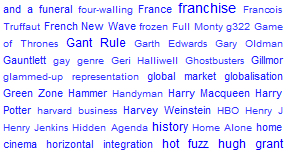I'll review past posts and in time combine in an overview post here.
China has risen dramatically as a box office force, to the point of usurping the US as the world's leading cinema market by overall box office take, fuelled by huge successive annual rises.
This smooth narrative has suddenly had a twist added, however, with 2016 figures far short of expectations.
The response has been an unofficial relaxing of the strict quota imposed on non-Chinese movies.
Up to 2012 a mere 20 were permitted to screen in Chinese cinema a year, but a 5 year deal boosted this to 34, and the expectation is of a large rise in this number when a replacement deal is negotiated in 2017.
There is a dual system in place. The distributors of the (currently 34) quota films are permitted to take 25% of box office take. Non-quota films can be released, but only receive a flat fee from Chinese operators, typically a small fraction of a potential box office share.
Despite the rigid protectionist rules, 38 Hollywood movies have been released under the 25% box office share system, the extra 4 being officially explained away as cultural exchanges, but generally seen as an attempt by the government to maintain the linear narrative of a mushrooming and therefore highly powerful Chinese cinema.
Free market enthusiasts or just Western readers may decry the authoritarian regime's protectionist stance, and will be cheered by the growing pressure China faces to conform to WTO (World Trade Organisation) rules or risk retaliatory import restrictions by the US and other key export markets.
However, the ruinous impact of Hollywood hegemony on domestic film production (and thus consumption) across the world should not be overlooked. The routinely big budget big six star-laden output crushes local competition in most markets.
France is among the major Western markets to impose its own restrictions to ensure that local language, domestic productions gain a share of exhibition space. Prior to the 80s free market fundamentalism of Thatcher, Britain had its own quota.
Without it we have a British film as the biggest hit of the year...only Bridget Jones's Baby has an American lead and distributor, and Working Title is a subsidiary of the big six giant NBC-Universal. Compare its box office take with what looks like the biggest British Indie hit of 2016, I, Daniel Blake, which may manage £1-2m. (BFI figures count WT as Indie, rather stretching the term)
China's limit on imported films relaxed amid box office downturn http://www.theguardian.com/film/2016/nov/01/china-limit-on-imported-films-relaxed-amid-box-office-downturn?CMP=Share_AndroidApp_Blogger
China passes law to ensure films 'serve the people and socialism'
http://www.theguardian.com/film/2016/nov/08/china-passes-film-industry-law-box-office-fraud?CMP=Share_AndroidApp_Copy_to_clipboard
Open door: who benefits most from Hollywood's courting of China?
https://www.theguardian.com/film/2016/dec/20/hollywood-china-big-industry-players?CMP=Share_AndroidApp_Copy_to_clipboard


